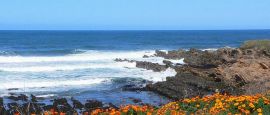California Health Care and Vaccinations
| Title | Special precautions |
|---|---|
| Diphtheria |
No |
| Hepatitis A |
No |
| Malaria |
No |
| Rabies |
No |
| Tetanus |
Yes |
| Typhoid |
No |
| Yellow Fever |
No |
Medical insurance is strongly advised. Only emergency cases are treated without prior payment and treatment may be refused without evidence of insurance or a deposit. All receipts must be kept in order to make a claim. Medical facilities are generally of a high standard.
In case of an emergency or accident, dial 911 from any public or private phone to be put in touch with paramedics, fire fighters, and police officers. Stay on the line until the operator instructs you to hang up.
Many medications available over the counter in other countries require a prescription in the US. Those visiting the USA for long periods with school-age children should be aware that school entry requirements in California include proof of immunisation against diphtheria, measles, mumps, tetanus, poliomyelitis, polio, rubella and pertussis (whooping cough). As of 2010, all restrictions against people with HIV have been lifted.
All restaurants in California are graded by the US health inspector with a letter rating system that must be hung in the front window. Any restaurant without an A or B rating is best avoided.
Food trucks, (mobile kitchens that sell food) are an increasingly popular option especially in Los Angeles and San Francisco. By law, food trucks are subject to the same health code requirements, inspections, and letter grade system that stationary restaurants are.
Tap water in California is very safe and governed by strict municipal laws that monitor purity and filtration. In 2011, several clean water bills were signed into law that guarantee clean drinking water in California, even in remote and disadvantaged communities.
Though the tap water is safe, drinking bottled water is very fashionable, especially water infused with vitamins or antioxidants. Many high end restaurants don’t offer water from the tap. Public drinking fountains are available in airports, parks, and schools but with increasing irregularity. Water bowls for pets are commonly placed on the sidewalk by local merchants, especially during the hotter months.
Raw fruits and vegetables should be washed with clean water before consuming for the removal of pesticides.
Health risks in California, especially Los Angeles which is smog prone, include air pollution. Asthma sufferers should take extra precaution and use a mask if biking in the city. Traffic accidents are also high due to the number of cars and motorists on the road. Sunburn and dehydration are common concerns during the hottest months and can be avoided by drinking lots of water, reapplying sunscreen, and staying out of direct sun from ten in the morning until two in the afternoon. Some beaches have riptides and high waves which means visitors should proceed with caution and only swim and surf at approved beaches where there are lifeguards and flag warning systems.
Do you have any Feedback about this page?
© 2026 Columbus Travel Media Ltd. All rights reserved. No part of this site may be reproduced without our written permission, click here for information on Columbus Content Solutions.









 You know where
You know where